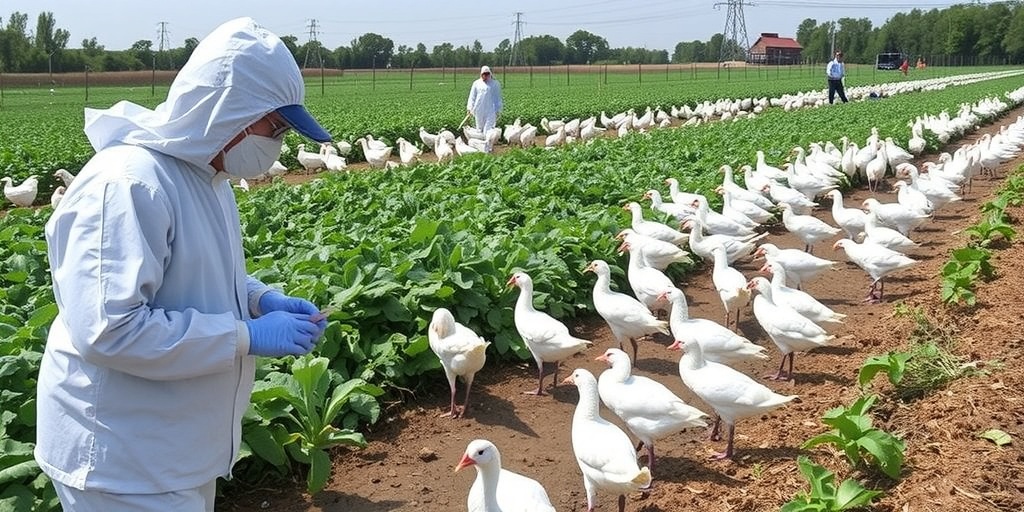Now Reading: Agriculture Department to Rehire Bird Flu Response Workers
-
01
Agriculture Department to Rehire Bird Flu Response Workers
Agriculture Department to Rehire Bird Flu Response Workers

USDA Working to Reinstate Employees Amid Bird Flu Crisis
The U.S. Department of Agriculture (USDA) is currently in the process of reversing the termination of certain employees who played crucial roles in responding to the escalating bird flu outbreak across the nation. In a statement released this week, officials indicated that the number of employees being rehired and the specific functions they will fulfill remain uncertain. However, it has been reported that numerous employees involved in managing the bird flu crisis received termination notices over the weekend. These mass layoffs were instituted following directives from President Trump and Elon Musk, who has been assigned the task of significantly downsizing government operations.
The USDA expressed its commitment to quickly rectify the situation, stating, “We are working to swiftly rectify the situation and rescind those letters.” Despite these assurances, the USDA has refrained from answering additional inquiries regarding the specific number of employees affected by the layoffs. So far, the agency has confirmed the loss of at least 4,200 jobs in total, though it has not disclosed how many of these positions were connected to bird flu response efforts.
This situation reflects a broader trend observed during the Trump administration, which has frequently reversed decisions following widespread budgetary cuts. Just last week, employees at the National Nuclear Security Administration were similarly terminated, only to have their firings rescinded shortly after.
As the USDA grapples with these staffing issues, scientists and public health officials have been voicing increasing concern over the H5N1 virus, known for affecting birds but which has begun to demonstrate the capacity to spread among mammals, including livestock. Reports indicate that the virus has infiltrated about 1,000 dairy herds across 16 states and has affected at least 69 individuals in the U.S. In a grim development, H5N1 has also led to the deaths of over 160 million farmed birds, resulting in significant egg shortages and soaring prices for consumers.
Experts in the veterinary field, such as Dr. Keith Poulsen, director of the Wisconsin Veterinary Diagnostic Laboratory, have highlighted that some of the terminated staff played critical roles in the National Animal Health Laboratory Network. This network connects numerous labs across the country authorized to carry out testing for the virus. Dr. Poulsen stated that the recent layoffs have “immediately impacted our ability to coordinate the disease response,” underscoring the importance of these employees in combating the outbreak. The decision to reverse these terminations has been met with relief by professionals across the laboratory network.
The current outbreak of H5N1 has raised alarms within the medical community, particularly as the virus has shown increased tendencies to "spill over" into mammals, such as dairy cows and even a growing number of domestic cats. Human cases primarily involve farm workers who come into direct contact with infected livestock or poultry. Thankfully, while most human cases have exhibited mild symptoms, a few individuals have been hospitalized and tragically, one person has lost their life due to complications arising from the virus.
While experts stress that H5N1 does not spread easily among humans and would need to undergo significant mutations to pose a pandemic threat, the total number of infections presents potential for further mutations, raising concerns about the future trajectory of the virus. Each new human case offers the virus opportunities for genetic changes that could enhance its transmissibility.
This situation serves as a reminder of the interconnectedness of human, animal, and environmental health—a principle encapsulated in the concept of One Health. As the USDA continues to navigate the complexities of employee management and public health response, the need for a robust and coordinated effort to control H5N1 is more pressing than ever. The government’s ability to adapt and respond to the challenges posed by evolving pathogens will be critical in safeguarding both agricultural interests and public health in the face of potential outbreaks.
Stay Informed With the Latest & Most Important News
Previous Post
Next Post
-
 01New technology breakthrough has everyone talking right now
01New technology breakthrough has everyone talking right now -
 02Unbelievable life hack everyone needs to try today
02Unbelievable life hack everyone needs to try today -
 03Fascinating discovery found buried deep beneath the ocean
03Fascinating discovery found buried deep beneath the ocean -
 04Man invents genius device that solves everyday problems
04Man invents genius device that solves everyday problems -
 05Shocking discovery that changes what we know forever
05Shocking discovery that changes what we know forever -
 06Internet goes wild over celebrity’s unexpected fashion choice
06Internet goes wild over celebrity’s unexpected fashion choice -
 07Rare animal sighting stuns scientists and wildlife lovers
07Rare animal sighting stuns scientists and wildlife lovers





















